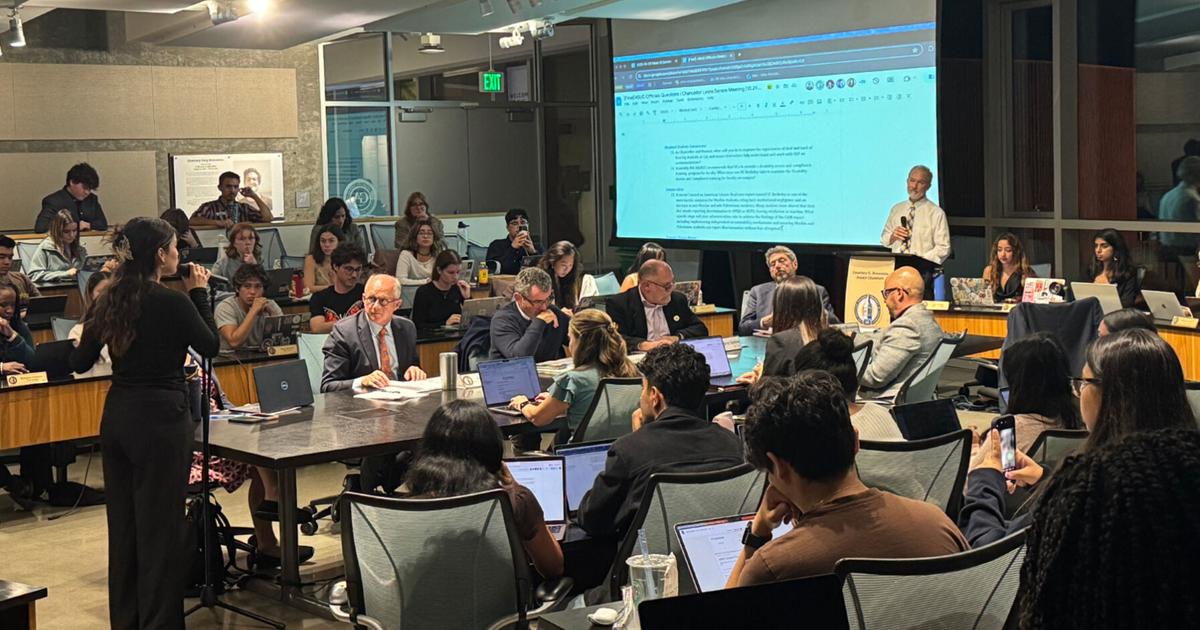During the last ASUC Senate meeting, UC Berkeley Chancellor Rich Lyons and his cabinet answered questions from senators and campus students on a range of issues, including future plans and funding concerns.
Since Lyons became Chancellor at the start of the 2024 school year, he has made meeting the ASUC Senate a semesterly tradition. As last Wednesday’s Q&A session drew the largest crowd to a senate meeting this semester, with roughly 100 attendees, some students were forced to stand or sit on the floor.
Lyons began the session by providing background information about his strategic plan for the future of campus. He said his office is collaborating with Creativity Partners, the Greater Good Science Center and other stakeholders in this plan.
“(UC) Berkeley is one of society’s most valuable assets,” Lyons said. “So if we’re going to paint a picture ten years from now of a (UC) Berkeley that’s bringing as much impact as possible to society, what does that course of action look like over the next 10 years? So that’s essentially the strategy process. Looking long at a long horizon.”
ASUC Vice President Isha Chander moderated and asked about the expansion of permanent spaces for cultural affinity groups and resource centers, especially in the Cesar E. Chavez Student Center. Vice Chancellor of Student Affairs Stephen Sutton responded by referencing the campus Student Life Master Plan.
“We looked at ways that we could take a deeper dive into … student-centered space on the campus,” Sutton said. “The Student Life Master Plan is a very ambitious plan. It’s a plan that looks years and years into the future. Cesar Chavez is a part of the plan.”
ASUC Student Advocate Britney Stephen requested an update on the student bereavement policy, which the Student Advocate Office has been working on since 2018.
According to Vice Chancellor of Academic Affairs Oliver O’Reilly, the Academic Senate conditionally approved the policy, provided there was sufficient funding for a full-time staff person to handle all cases. Currently, O’Reilly said, there is only funding for a tenth of a staff member’s salary, and the Academic Senate “needs to reconsider” the policy.
ASUC Senator Bella Santos asked if the chancellor’s administration is committed to securing funding for the completion of the Clean Energy Campus Project.
According to Vice Chancellor of Administration Marc Fisher, the campus has secured $270 million from the state through student, donor and regent advocacy. Additionally, phase one of the project aims to “decarbonize the campus” by 60% as the campus plans to begin construction on an associated plan in spring.
ASUC Senator Sara Terán, on behalf of undocumented students, asked Lyons how the campus plans to implement sanctuary campus pledges as the federal government increases federal immigration enforcement across the country.
Last month, President Donald Trump announced an enforcement “surge” in the Bay Area, prompting local leaders to prepare for an increased federal presence. While the surge was called off, uncertainty lingers for many students.
“I want to assure you that we are committed to ensuring that the (UC Berkeley) remains safe and accessible to all of our community members, regardless of immigration status,” Lyons said. “More specifically, we have had a long-standing policy that UC police will not investigate, detain or arrest individuals who are suspected of violating federal immigration law.”

